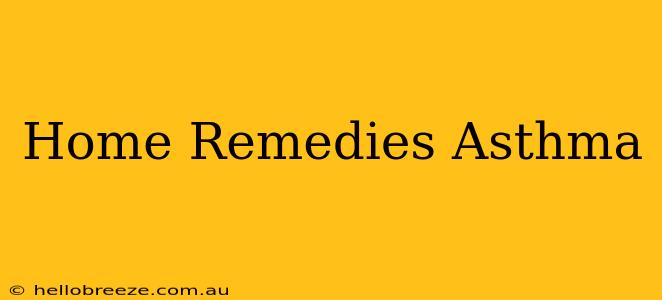Asthma is a chronic respiratory condition affecting millions worldwide. While medication is crucial for managing asthma, exploring home remedies can complement your treatment plan and offer natural ways to alleviate symptoms. This information is for educational purposes only and should not replace advice from your doctor or other healthcare professional. Always consult your healthcare provider before starting any new treatment, including home remedies, especially if you have a severe asthma condition.
Understanding Asthma Triggers and Symptoms
Before diving into home remedies, it's vital to understand your asthma triggers. Common triggers include:
- Allergens: Dust mites, pollen, pet dander, mold
- Irritants: Smoke, air pollution, strong smells (perfumes, cleaning products)
- Respiratory Infections: Colds, the flu
- Exercise: Physical exertion can trigger symptoms in some individuals
- Stress and Emotions: Anxiety and stress can worsen asthma
Recognizing your personal triggers is the first step towards effective management. Typical asthma symptoms include:
- Wheezing: A whistling sound during breathing
- Shortness of breath: Difficulty catching your breath
- Chest tightness: A feeling of constriction in the chest
- Coughing: Often worse at night
Effective Home Remedies for Asthma Relief
Several home remedies may help manage asthma symptoms, but remember that these are not cures and should be used in conjunction with prescribed medication.
1. Steam Inhalation:
Steam inhalation can help loosen mucus and open airways. Simply inhale steam from a bowl of hot water (be cautious to avoid burns) or use a humidifier. Adding a few drops of eucalyptus oil (known for its decongestant properties) can enhance the effect.
2. Hydration:
Staying well-hydrated is essential for thinning mucus and improving lung function. Drink plenty of water throughout the day. Warm liquids like herbal teas (chamomile, ginger) can also be soothing.
3. Ginger:
Ginger possesses anti-inflammatory properties that may help reduce airway inflammation. You can consume ginger in various ways: fresh ginger tea, adding it to food, or taking ginger supplements (always check with your doctor before taking supplements).
4. Saline Nasal Rinse:
A saline nasal rinse can help clear nasal passages of allergens and irritants, thus reducing the chances of triggering an asthma attack. You can purchase pre-made saline solutions or make your own with salt and distilled water.
5. Lifestyle Changes:
Lifestyle changes can significantly impact asthma management. These include:
- Regular Exercise: Engage in regular physical activity, but be mindful of triggers.
- Stress Management: Practice relaxation techniques like yoga, meditation, or deep breathing exercises.
- Dietary Changes: A balanced diet rich in fruits and vegetables can support overall health and lung function.
- Avoid Triggers: Identify and avoid your personal asthma triggers as much as possible.
When to Seek Medical Attention
It's crucial to seek immediate medical attention if you experience:
- Severe shortness of breath
- Rapid heart rate
- Difficulty speaking in complete sentences
- Wheezing that doesn't improve with medication
- Blue tinge to your lips or fingernails (cyanosis)
Home remedies are supplementary, not replacement therapy for asthma. Always follow your doctor's advice and adhere to your prescribed medication regimen. Never stop taking your medication without consulting your physician.
This information is for general knowledge and does not constitute medical advice. Always consult with a healthcare professional for any health concerns or before making any decisions related to your health or treatment.

